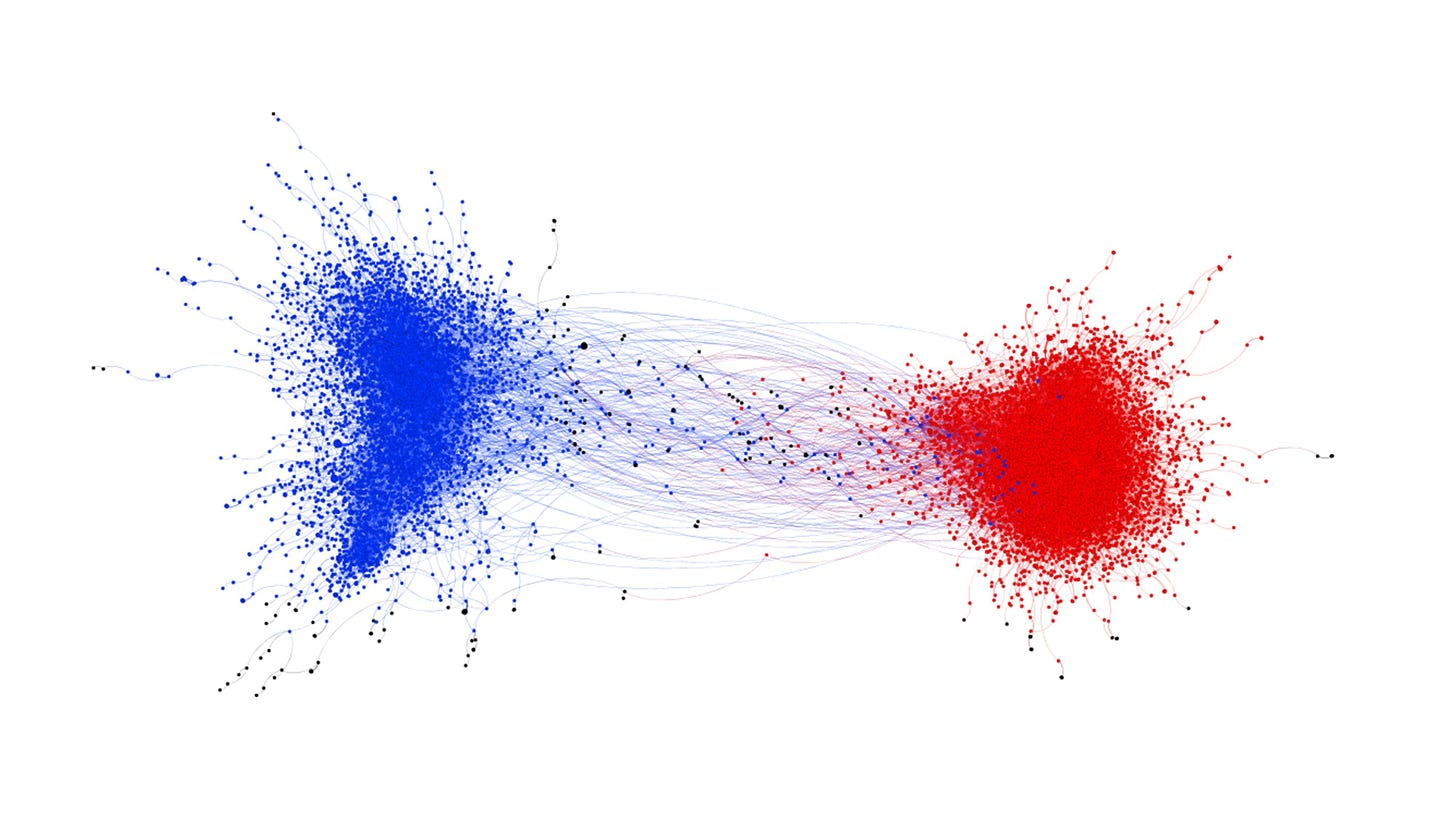The first half of each coffee shop conversation is free, the rest is for paid subscribers. If you want more, here are the latest free essays: Phoenix Avatars and Main Character Syndrome, and How Viruses Made Us Human.
Oh, you’re already here. It’s been a while since we had a coffee shop conversation. How have you been? Wait, I’ll go order first. Flat white for you, I remember. Cold brew for me. I’ll grab us both a muffin too — those wannabe healthy ones with more calories than a donut. Sneaky food industry.
Anyway, Tell me everything. What’s been on your mind lately? Have you read or seen anything good?
Silent middle
I’ve learned a lesson. Don’t post anything that even remotely sounds like politics. Perhaps I should have known. The world, after all, has only gotten more polarized.
Except… has it? If you ask people, say 2021 Biden and Trump voters, to rank dozens of statements about the desired future for the nation, you find general agreement (with a few notable exceptions). On most matters of policy, people overestimate how extreme the views of the average ‘opposite’ voter are. Yet, at the same time, (global) political polarization has never been larger when it comes to matters of identity and emotion, also known as ‘affective polarization’.
Meet the internet, where the only content that gets views highlights extreme viewpoints. A recent study, for example, finds that political interactions on the platform formerly known as Twitter are ‘structurally polarized’. A 2017 study of politics on Twitter already found how messages with moral and emotional language across all political topics (gun control, same-sex marriage, climate change…) were,
… bounded by group membership; moral-emotional language increased diffusion more strongly within liberal and conservative networks, and less between them.

The platforms where we spend more and more of our time show us more and more extreme views, distorting our image of the average voters with different political convictions. Some politicians lean into this, use fake news and exaggerations to lean into this emotional polarization, and the resulting disinformation only widens the affective gap, which emboldens the few who actually hold extreme views.
My political Note (which I didn’t even consider all that political) introduced me to a warm cuddle of online animosity, but it also led to a few thoughtful and respectful replies from people who disagree with my (perceived) political stance. Those were very much appreciated.
Between the extremes, there is a silent middle.
Magician’s ball
These are different life stages of Magosphaera planula (or, the magician’s ball).

Magoshpaera is a microscopic organism German biologist Ernst Haeckel found while studying sponges off the Norwegian island Gisoe in September 1869.
No one has seen it since. All we have is Haeckel’s single observation.
Was something wrong with his microscope? Was he hallucinating? Or is the magician’s ball just one of many mysteries in our seas and oceans? Whatever the case, this single encounter with a mystery microscopic organism shaped Haeckel’s recapitulation theory, or the idea that embryos ‘recapitulate’ evolution. I’m sure you’ve seen some of those illustrations. An embryo first looks like a little fish, then an amphibian, a reptile, a mammal, and then we arrive at humans. We now know that’s not how evolution and embryonal development work, but Haeckel gave us one of the first theories that linked ontogeny (development) and phylogeny (evolutionary ancestry) — the start of modern evo-devo (evolutionary developmental biology).
1.5°C
That’s the limit, set at the 2015 Paris Climate Accords, under which the impact of climate change is supposed to remain manageable. But 1.5°C compared to what?
Keep reading with a 7-day free trial
Subscribe to Subtle Sparks to keep reading this post and get 7 days of free access to the full post archives.





